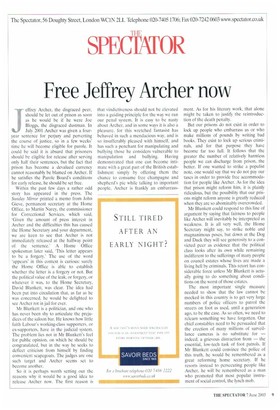Free Jeffrey Archer now
effrey Archer, the disgraced peer, should be let out of prison as soon as he would be if he were Joe Bloggs, the disgraced dustman. In July 2001 Archer was given a four year sentence for perjury and perverting the course of justice, so in a few weeks' time he will become eligible for parole. It could be said it is absurd that prisoners should be eligible for release after serving only half their sentences, but the fact that prison has become a devalued currency cannot reasonably be blamed on Archer. If he satisfies the Parole Board's conditions for early release, he should be set free.
Within the past few days a rather odd story has appeared in the press. The Sunday Mirror printed a memo from John Gieve, permanent secretary at the Home Office, to Martin Narey, the commissioner for Correctional Services, which said, 'Given the amount of press interest in Archer and the difficulties this has caused the Home Secretary and your department, we are keen to see that Archer is not immediately released at the halfway point of the sentence.' A Home Office spokesman later said, 'This letter appears to be a forgery.' The use of the word 'appears' in this context is curious: surely the Home Office is able to establish whether the letter is a forgery or not. But the political value of the leak, or forgery, or whatever it was, to the Home Secretary, David Blunkett, was clear. The idea had been put into circulation that, as far as he was concerned, he would be delighted to see Archer rot in jail for ever.
Mr Blunkett is a politician, and one who has never been shy to articulate the prejudices of the saloon bar. He knows how little faith Labour's working-class supporters, or ex-supporters, have in the judicial system. The problem lies not in Mr Blunkett's feel for public opinion, on which he should be congratulated, but in the way he seeks to deflect criticism from himself by finding convenient scapegoats. The judges are one such target and Archer seems set to become another.
So it is perhaps worth setting out the reasons why it would be a good idea to release Archer now. The first reason is that vindictiveness should not be elevated into a guiding principle for the way we run our penal system. It is easy to be nasty about Archer, and in some ways it is also a pleasure, for this wretched fantasist has behaved in such a mendacious way, and is so insufferably pleased with himself, and has such a penchant for manipulating and bullying those he considers vulnerable to manipulation and bullying. Having demonstrated that one can become intimate with a great part of the British establishment simply by offering them the chance to consume free champagne and shepherd's pie while talking to important people. Archer is frankly an embarrass ment. As for his literary work, that alone might be taken to justify the reintroduction of the death penalty.
But our prisons do not exist in order to lock up people who embarrass us or who make millions of pounds by writing bad books. They exist to lock up serious criminals, and for that purpose they have become far too full. It follows that the greater the number of relatively harmless people we can discharge from prison, the better. If one wanted to strike a populist note, one would say that we do not pay our taxes in order to provide free accommodation for people like Archer. As for the idea that prison might reform him, it is plainly ridiculous, but the possibility that our prisons might reform anyone is greatly reduced when they are so abominably overcrowded.
Mr Blunkett could respond to this line of argument by saying that fairness to people like Archer will inevitably be interpreted as weakness. It is all very well, the Home Secretary might say, to strike noble and magnanimous poses, but down at the Dog and Duck they will see generosity to a convicted peer as evidence that the political class looks after its own while remaining indifferent to the sufferings of many people on council estates whose lives are made a living hell by criminals. This retort has considerable force unless Mr Blunkett is actually going to do something about conditions on the worst of those estates.
The most important single measure needed to show that the law cannot be mocked in this country is to get very large numbers of police officers to patrol the streets on foot as used, until a generation ago, to be the case. As so often, we need to relearn something we have forgotten. Our chief constables need to be persuaded that the erection of many millions of surveillance cameras is no substitute for — indeed, a grievous distraction from — the essential, low-tech task of foot patrols. If Mr Blunkett could convince the police of this truth, he would be remembered as a great reforming home secretary. If he resorts instead to persecuting people like Archer, he will be remembered as a man who promoted that most popular instrument of social control, the lynch mob.










































































 Previous page
Previous page